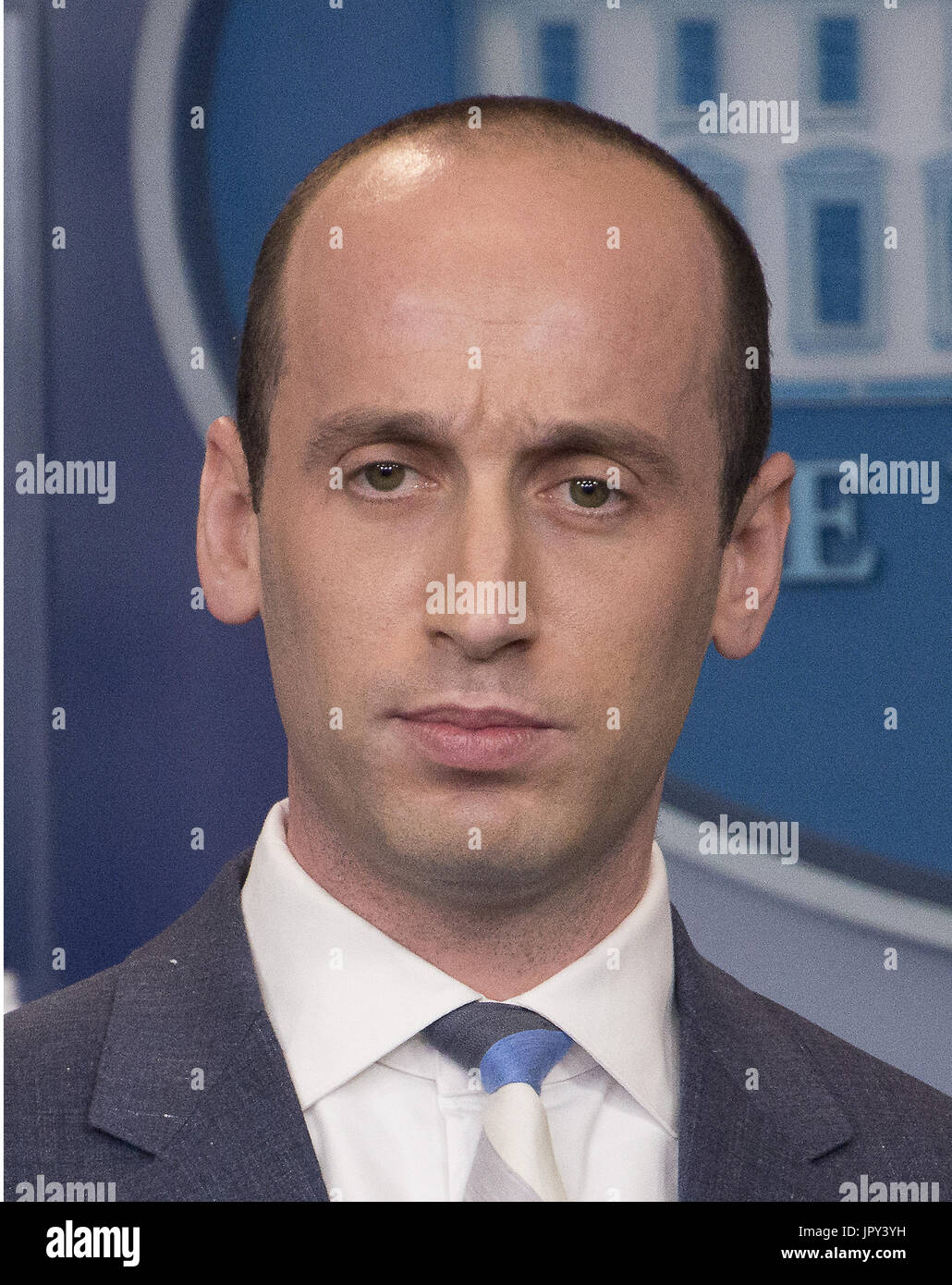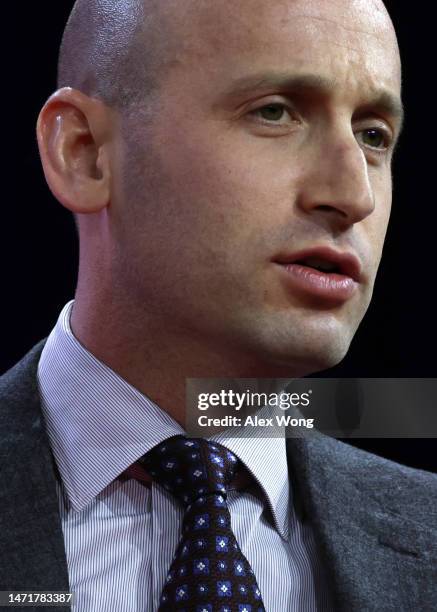Is Stephen Miller, a name synonymous with the Trump era, truly as influential as he appears? His fingerprints are seemingly everywhere, from immigration policy to the echoes of the 2020 election, solidifying his position as a key player in the political landscape.
Stephen Miller has re-emerged, no longer content to operate in the background. Now a highly visible presence in Washington, he wields significant power, often meeting with the president in the Oval Office alongside Chief of Staff Susie Wiles. His influence is palpable, extending beyond the immediate confines of the White House and shaping policy decisions across various government departments. This enhanced visibility marks a shift from his previous role, indicating a strengthened grip on power and a more pronounced role in shaping the administration's direction.
| Category | Details |
|---|---|
| Full Name | Stephen Miller |
| Date of Birth | August 23, 1985 |
| Place of Birth | Santa Monica, California, U.S. |
| Education | Duke University (B.A.) |
| Political Affiliation | Republican |
| Known For | Anti-immigration policies, Senior Advisor to Donald Trump, Role in 2020 election claims, Promotion of white nationalist views |
| Current Position | Deputy Chief of Staff and Homeland Security Advisor to Donald Trump |
| Previous Positions | Senior Advisor to Donald Trump, Communications Director for Jeff Sessions (former U.S. Senator) |
| Key Policies & Actions |
|
| Controversies |
|
| Notable Quotes |
|
| External Link (for reference) | Wikipedia - Stephen Miller |
Miller's influence is underscored by his frequent access to the president. This close proximity grants him a significant advantage in shaping policy and influencing decisions. He is one of the few officials who have regular, direct contact with Trump, allowing him to advocate for his policy preferences and shape the administration's agenda. This privileged access amplifies his already substantial authority within the White House and across government agencies.
The appointment of Miller as Deputy Chief of Policy in a new administration, following his tenure as a senior aide, further solidifies his influence. This move signaled a continuation of his hardline immigration stance and his commitment to shaping policy in line with his ideological beliefs. The selection of individuals like Elise Stefanik, known for their conservative viewpoints, to key positions such as U.S. Ambassador to the United Nations, also reflects Miller's influence in shaping the personnel of the administration.
Miller's actions extend beyond policy formulation; he is known to be unafraid of directly challenging the media. A notable instance of this was his public criticism of the press corps for their perceived lack of understanding of immigration laws. Such public pronouncements demonstrate his willingness to confront criticism and to defend the administration's policies even in the face of scrutiny. His approach suggests a strategic effort to control the narrative and to assert the administration's dominance in the public discourse.
The intensity of the press's interactions with Miller frequently reached a fever pitch, as evidenced by the exchange with Fox News anchor John Roberts, where Miller advised the network to fire its polling team. This direct and public rebuke underscores Miller's confrontational approach and his comfort in challenging even prominent media outlets. Such occurrences highlight his unwavering commitment to defending the Trump administration's stance, even when it involves publicly criticizing the media.
Miller's influence extends beyond immigration; he is involved in broader policy areas, including the economy and national security. This diverse involvement indicates a broad reach within the administration and an ability to influence the trajectory of various aspects of governance. His grasp of multiple policy domains showcases the depth of his power and the multifaceted nature of his influence in Washington.
His role in the 2020 election aftermath has also fueled debates about his influence. Miller was a prominent voice in promoting claims of election fraud. This active role in challenging the election results sparked controversies and highlighted his dedication to defending the administration's stance, even when faced with considerable criticism. His actions further solidified his position as a polarizing figure within the political landscape.
Miller's influence is inextricably linked to the contentious issue of immigration. He played a critical role in shaping the administration's zero tolerance policy, which resulted in the separation of families at the border. His work on the travel ban targeting several Muslim-majority countries further underscores his impact on immigration policy. These actions reflect a clear commitment to implementing strict measures and drastically altering the United States' approach to immigration, sparking significant ethical and legal debates.
Miller's anti-immigration stance is well-documented, and his impact on shaping policies reflects this. His unwavering focus on strict border control measures and increased deportations has made him a prominent figure in the national conversation about immigration. He has consistently advocated for policies that he believes will protect the country's borders and enforce its immigration laws, generating both support and opposition for his viewpoint.
The intensity with which he articulates his positions on immigration, including his use of strong language in discussing border security, is indicative of his approach. He uses emphatic language to emphasize the administration's concerns and to justify its policies. His rhetoric seeks to persuade the public of the severity of the challenges and to gain support for his policy choices.
In addition to his policy work, Miller has also engaged in public relations. This has included press briefings where he's criticized reporters for their understanding of immigration laws. Such behavior underscores his commitment to defending the administration's stance and controlling the public's perception of it. These interactions show his belief in influencing the narrative and in confronting those he deems critical of the administration.
Miller's influence extends beyond immigration; he's involved in broader policy areas, including national security. This diverse involvement indicates a broad reach within the administration and an ability to influence the trajectory of various aspects of governance. His grasp of multiple policy domains showcases the depth of his power and the multifaceted nature of his influence in Washington.
His history in politics provides important context to assess his ongoing role. Before his high-profile position in the Trump administration, Miller served as communications director for Jeff Sessions. This experience helped shape his understanding of political strategy and public relations. His familiarity with navigating the political landscape and building alliances has allowed him to strengthen his influence and achieve policy goals.
His actions have made him a deeply polarizing figure. His staunch defense of the Trump administration's policies, and his advocacy for hardline immigration measures, have garnered him both fervent supporters and vocal critics. This division highlights the complex nature of his influence and the highly charged political environment within which he operates.
The media often focuses on the controversial aspects of Miller's work. His actions have drawn both praise and criticism. Some see him as a dedicated public servant fighting for his beliefs, while others criticize his rhetoric and the effects of his policies. Understanding the different perspectives is essential for a complete evaluation of his influence.
The question remains whether his influence will endure beyond the current administration. The lasting impact of his policies on immigration and the broader political landscape will be assessed for years to come. The decisions he has helped shape, and the relationships he has built, will determine the direction of American politics long after the immediate political climate fades. His actions have not only shaped the political discourse but also had a lasting effect on the lives of many people, demonstrating the significance of his power.



